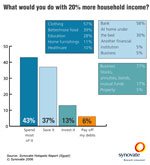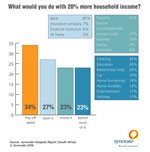
Battle of the brands for emerging market hearts
While almost 60 percent of consumers in emerging market countries would buy a local brand over an international brand if both products were of equal price, consumers in these ‘Hotspots’ countries have the same brand preferences for cars (Toyota), fast food (McDonalds) and hotels (Hilton) as developed market consumers, reveals global market research company Synovate.
The main difference? Sony is the preferred manufacturer for MP3 players in Hotspots countries whereas Apple’s iPod rules in developed markets.
Combining quantitative data with the deeper insights from a qualitative approach, Synovate surveyed over 13,000 consumers in 20 Hotspots markets around the world to gain a better understanding of their relationships with brands and their brand preferences across a range of product categories.
Brands matter
Synovate’s Global Head of Insights, Jan Hofmeyr, said the results show that, regardless of the nationality of the product or the consumer, brands matter strongly to all consumers and provide a functional and emotional point of reference for purchasing behaviour for rich and poor alike.
“Consumers in emerging markets demonstrate a greater propensity than those in developed markets to believe that international brands are of better quality than local brands, with only 30 percent of developing market respondents indicating that local brands are just as good as those internationally manufactured,” he said.
As shown in the graphs below, 47% of South Africans believe that locally manufactured brands are of the same quality as international brands. Demonstrating the opposite view, only 8% of Egyptians believe the same of their local brands.
(South Africa)
(Egypt)
“However, this doesn’t necessarily translate into purchasing behaviour, as almost 60 percent of these same consumers said they are more likely to buy a local brand over an international product if both are of equal price. This apparent dichotomy provides a clear message: It is not the nationality of the brand but the brand itself that matters, with either its ability to indicate quality from a functional perspective or the emotional satisfaction it provides,” he added.
Brand preferences around the world
Consumers were asked about their brand preferences across a variety of products and services that they use including automobiles, hotels, quick serve restaurants and home electronics. The results are consistent, showing that global brands are the most popular among all consumers.
When it comes to cars, Toyota is the preferred automobile brand, with Ford, Volkswagen and BMW also making a strong showing.
Hilton was selected as the best overall hotel chain among consumers in both emerging and developed markets, along with other popular hotel brands including Holiday Inn, Marriott and Sheraton. Emerging market consumers in Asia, however, show a strong preference for local brands such as the Oriental Hotel and Shangri-La.
Not surprisingly, global fast food giant McDonald’s was seen as the preferred quick serve restaurant by most consumers surveyed. However, KFC is considered the superior fast food chain among consumers in South Africa, Egypt and Asia.
Emerging market consumers feel that Nokia and Motorola are the best mobile phone brands, but are heavily divided on the best Large / Flat screen TV manufacturer. Asians and Eastern Europeans see Sony TVs as the best, as do the Turks, but Latin Americans prefer Philips and Panasonic. Samsung was considered the favourite among consumers in Russia and Hungary.
Hofmeyr said that the results show that consumers in all markets are aware of and feel positive towards global brands but in developing markets, global brands have become shorthand for quality.
“Global brands have a strong functional foundation, as well as established marketing programmes, and local manufacturers may have a battle on their hands to catch up with the perceived quality of large global products.
“However, global brands should not become complacent, for as local manufacturing improves and their marketing becomes more savvy, they have an easy point of entry with developing market consumers who are very numerous and very willing to consider local alternatives,” he added.
The Hotpots countries examined by Synovate include Argentina, Brazil, Bulgaria, China, Egypt, Hungary, India, Indonesia, the Kingdom of Saudi Arabia, Mexico, Morocco, Poland, Romania, Russia, Serbia, South Africa, Thailand, Turkey, the Ukraine and the United Arab Emirates. Consumers in three developed markets – the US, UK and Japan – were also surveyed for comparison purposes.
Extracts from the South African and Egyptian Hotspots reports are shown below:
(Egypt)
(South Africa)
Hotspots brands [Microsoft Excel]
For more information on Synovate’s research on emerging markets and available reports, please visit www.synovate.com/knowledge/publications/hotspots.
Curiosities
> Consumers in all markets are aware of and feel positive towards global brands but in developing markets, global brands have become shorthand for quality.
> Even though emerging market consumers feel positive towards global brands, this doesn't necessarily translate into purchasing behaviour. Almost 60 percent of these consumers are more likely to buy a local brand over an international product if both are of equal price.
> Local manufacturers in emerging markets may have to battle to catch up with the perceived quality of large global brands but as their manufacturing and marketing improves, they may find many emerging market consumers who are very willing to consider local alternatives.
About Synovate
Synovate, the market research arm of Aegis Group plc, generates consumer insights that drive competitive marketing solutions. The network provides clients with cohesive global support and a comprehensive suite of research solutions. Synovate employs over 5,700 staff in 118 cities across 52 countries.
For more information on Synovate visit www.synovate.com.
Ipsos is an innovative, entrepreneurial, client-focused organisation, providing research services to clients on a global basis. We set ourselves high standards and aim to work collaboratively in partnership with our teams in order to service our clients most effectively.
- Unlocking the value of creativity in advertising: How to bridge the creativity gap15 Apr 13:47
- 4 habits keeping your brand poor26 Mar 16:08
- Understanding consumer mindsets for growth in 202407 Mar 08:52
- South Africa's unemployment nightmare: The burden on its people09 May 10:05
- Global survey shows shrinking trust in internet29 Nov 10:17
















